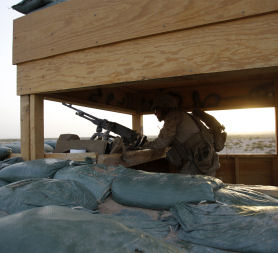Warnings over US-UK Afghanistan mission rivalries
As a US Marine commander criticises British forces in the Afghanistan flash point of Musa Qala, Colonel Richard Kemp writes how such open criticism will damage relations between the two allies.

US Marines are among the finest combat forces in the world. When fighting alongside them in the first Gulf War, I quickly recognised just how much they had in common with the British Army.
Their size, traditions and ethos in many respects make them closer in style and approach to our army than to their own.
In his criticism of the British approach in Musa Qala, I hope and believe that US Marines Lieutenant Colonel Michael Manning, quoted in the Washington Post, is not casting doubt on the courage, tenacity and aggression of our troops.
Time and again in Afghanistan, British soldiers and Marines, with bravery and fighting spirit that takes the breath away, have proved themselves second to none. But our forces have for years been fighting to contain a growing insurgency with highly inadequate resources.
Fewer than ten thousand troops could never have hoped to do all the fire fighting against Taliban encroachment that was necessary, let alone be in a position to protect the Afghan communities, even in the major population centres alone.
That is why they had to make a peace deal over Musa Qala in 2006, at which time the British Helmand Task Force numbered fewer than 1,000 fighting troops. And that is why, after re-taking the town in 2007 with the US 82nd Airborne Division, they were unable to push out as far as they would have liked in pursuit of the Taliban.
In the words of the shopkeeper quoted in the Washington Post: “They would fight and leave”. They didn’t leave to go and drink tea in their bases, they left to go and fight other pockets of Taliban in other parts of Helmand. And the shortage of resources applies at least as much to reconstruction efforts.
Money has been woefully tight, and remains far from adequate. The shortcomings in the British military and civil counter-insurgency campaign are due to a government that for years grossly underestimated the Taliban and the threat they presented, and that lacked the focus and will to properly resource the campaign and to drive an effective cross-government effort to win in Helmand.
But as so often in the past, our forces did the best they could with what they had.
Lieutenant Colonel Manning’s superior, US Marines Major General Richard Mills, commander of Allied forces in Helmand, acknowledges the heavy price in blood paid by the British. He also recognises that any success the Marines are achieving – with substantially greater combat resources – is based on the work done by our troops.
Despite the close bond between British and American forces, built up in hard fighting during wars and campaigns over the past century, rivalry and criticism is forever present. You only have to think of the tempestuous relationship between British General Bernard Montgomery and American General George Patton in the Second World War.
Sometimes rivalry in such circumstances can be healthy, fostering improvement to combat techniques and spurring both forces on to greater victories. But in the complex and precariously-balanced counterinsurgency war we are fighting in Afghanistan, open criticism of the kind that Lieutenant Colonel Manning has voiced is dangerous.
He undoubtedly recognises that one of the greatest challenges for both of our national forces is winning and keeping the confidence of the local people. People without whom we cannot prevail. People who live with a real fear that we might soon leave them to the unspeakable horrors of the Taliban.
To see such apparent division between the Allied armies on which they are so dependent can only undermine whatever confidence we are able to build.
And we can be sure that the Taliban have already read, analysed, and taken heart from Lieutenant Colonel Manning’s comments in the Washington Post.
Colonel Richard Kemp is the former commander of British forces in Afghanistan and author of Attack State Red, an account of combat in Afghanistan. Follow him on Twitter @ColRichardKemp.